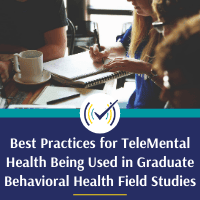This course does not offer CE Credits. The same course is available for purchase and offers 1 CE hour for behavioral health clinicians. See "related products" below.
The global pandemic significantly impacted master's level counseling field experience student engagements with clients. This impact also affected traditional supervision strategies for site and faculty supervisors. In this course, participants will learn ethical and legal implications of telemental health and the emotional impact on-site supervisors, faculty, and students while implementing new protocols to supervise novice counselors.
This is a non-interactive self-study course.
Instruction consists of 1 hour of video instruction and an evaluation.
Learning Objectives:
- Illustrate healthy self-care strategies as one transitions from face-to-face to TeleMental Health.
- Assess protocols to supervise novice counselors when using telemental health, examine the legal implication of TeleMental Health with students.
- Examine the ethical impact TeleMental Health has on client care, discern the emotional impact pandemics have on-site supervisors, faculty, and students.
From the time of registration, you have six months to access the coursework.
Dr. Nivischi N. Edwards, Pd.D, LPC, LMHC, NCC, BC-TMH holds a Doctoral degree in Counselor Education from the University of Central Florida, Master’s degree in Community Counseling from Andrews University, and Bachelor’s degree in Psychology from Syracuse University. Dr. Nivischi is a Licensed Counselor in two states and operates a virtual private practice as a Board Certified TeleMental Health Counselor. She also trains master’s and doctoral level counseling students online with Liberty University.
Dr. April R. Crable, Ph.D., MBA, LPC, NCC, SOTP, CSAC is a Licensed Professional Counselor in the states of Arizona, Florida, Texas, New York and Virginia. Additionally, she is both a Certified Substance Abuse Counselor and Sex Offender Treatment Provider in the state of Virginia. A graduate of Old Dominion University and Regent University respectively. April has worked in the mental health field for over a decade as a private practice owner, executive director, clinical director, clinical supervisor, clinical consultant, therapist, college administrator, professor, and national presenter.
This course does not offer CE credits, just great content.
The same course is available for purchase and offers 1 CE hour for behavioral health clinicians. See "related products" below.
Participants may request a printed version of their certificate of attendance to be delivered by mail. A shipping/handling fee of $6.95 will be charged per request. Shipping internationally may require an additional charge.
This is a non-interactive, self-study course.
To receive your certificate of attendance you must complete the course in its entirety.
To complete a Training Video Course, one must register, log in, select the My Courses option from the menu items, click the Course Title, attend to the video content, and complete the course evaluation, then claim the certificate of attendance.
You can download or print your certificate of attendance by logging into your account, navigating to the course by selecting the My Courses option from the menu items, clicking the Course Title, scrolling to the Certificate of Attendance section, and clicking on the Certificate of Attendance link to either download it or print it.
Participants may request a printed version of their certificate of attendance to be delivered by mail. A shipping/handling fee of $6.95 will be charged per request. Shipping internationally may require an additional charge.
Directions for completing a course can be found by clicking here.
This course is intended for clinicians who provide behavioral health services.
This is a non-interactive, self-study course. Teaching methods for this course include recorded lectures, videos, and a course evaluation.
This course was recorded 05/19/2020



